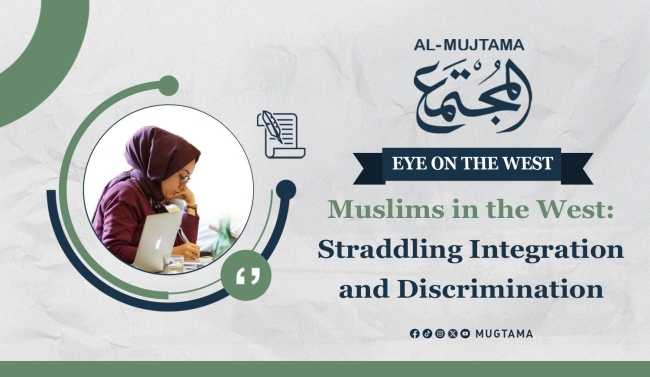Muslims in the West: Straddling Integration and Discrimination
In recent decades, there has been an increase in migration to Western countries for various reasons, primarily economic and political. With time and the growing Muslim population in the West, certain tensions and issues have emerged between Muslim communities and Western governments, escalating in recent years. Many of these issues have become global crises focused on Muslim identity and the interplay of migration policies, security concerns, fear of terrorism, and sometimes, systematic smear campaigns that end up targeting individuals caught in the midst of these conflicts.
Reasons for the Tensions:
1. September 11
A Turning Point Following the tragic events of September 11, Muslims in the West were immediately cast under suspicion, with the media often portraying them in a negative light. Even though many Muslims were already struggling with integration issues in Western society, public opinion began increasingly targeting Muslims, which led to rising hostility and discrimination against them, intensifying their challenges. Many Muslims felt they were viewed as foreigners or threats, even if they were citizens born and raised in these countries.
2. Migration and Integration Policies
Migration policies in Western countries are a major factor in these tensions. There is an ongoing debate about Western societies' ability to accommodate Muslim immigrants, with some governments viewing cultural and religious differences as barriers to integration. Certain Islamic values—such as religious attire and gender roles—are sometimes perceived as conflicting with Western values, which emphasize individual freedom and equality. This often leads Westerners to view anything unfamiliar as oppressive and restrictive. As a result, the restrictions placed on Muslim communities become increasingly stringent, causing Muslims to feel targeted and restricted, especially when these policies are applied more rigorously to them than to other immigrant groups.
3. Islamophobia and Fear of the 'Other'
Islamophobia is a prominent issue in Western societies. Muslims face negative stereotypes fueled by the media's focus on issues of extremism, often portraying it as rooted solely in Islam and Muslims. For example, a perpetrator from an Arab or Muslim background is labeled a "terrorist," while those from other backgrounds might be termed simply "offenders." This has magnified fears about Muslims in general, resulting in attacks against Muslims, their homes, and mosques—especially against women who wear hijabs or niqabs.
The rising tensions and discrimination against Muslims have impacted various aspects of their lives, including workplaces and educational institutions. Studies show that Muslims face greater challenges in obtaining jobs or advancing in their careers compared to others, as they are often discriminated against based on their names or religious appearance. This marginalization has led many Muslims to feel excluded. For instance, statistics from the United Kingdom show that Muslims face the highest rates of unemployment among ethnic minorities, with levels nearly twice the national average, according to the UK's Social Mobility Commission. Similarly, in schools, Muslim students face bullying and discrimination from both peers and some teachers, which increases psychological and social tensions among them.
Despite efforts to improve the image of Muslims and combat ideological prejudice, Islamophobia remains an escalating issue. Surveys in the United States and Europe indicate that a significant percentage of citizens hold negative views towards Muslims, with some even adopting racist ideas, believing that Muslims deserve harsh treatment or complete exclusion. According to the Pew Research Center and the European Union Agency for Fundamental Rights, hate crimes against Muslims have risen in recent years, reflecting a hostile environment in many Western communities and highlighting the need for societal awareness and change to address these challenges.
Possible Solutions to Ease the Tensions:
Addressing the tensions between Muslim communities and Western governments requires comprehensive strategies that respect human rights and cultural diversity. By fostering mutual understanding and working towards fair and inclusive policies, peaceful coexistence can be achieved, turning challenges into opportunities for cooperation and building a cohesive society that respects all cultural and religious identities.
Western governments should enhance fair integration policies and adopt approaches that respect the cultural and religious diversity of Muslims, ensuring their right to freely practice their faith. This includes providing educational and employment opportunities that contribute to social stability for Muslim communities without imposing a particular cultural pattern upon them.
Fighting Islamophobia and raising public awareness also require community-based efforts, beginning with education and media, to present a balanced and realistic image of Muslims and their role in society. Social initiatives can also encourage dialogue and understanding between Muslims and non-Muslims to foster better awareness of their culture and beliefs.
Furthermore, it is essential for governments to implement security policies that do not specifically target Muslims, ensuring justice and non-discrimination. Additionally, involving Muslim community leaders in developing strategies to combat extremism can help build mutual trust.
-------------------------------------------------------------
Sources:
- A study published on the Social Mobility Commission
- A study published on the Pew Research
- A study published on the European Union Agency for Fundamental Rights
- Reports and studies published on the Center for Civilization Studies and Research
- A report published on the Ru'ya Center for Strategic Studies website


